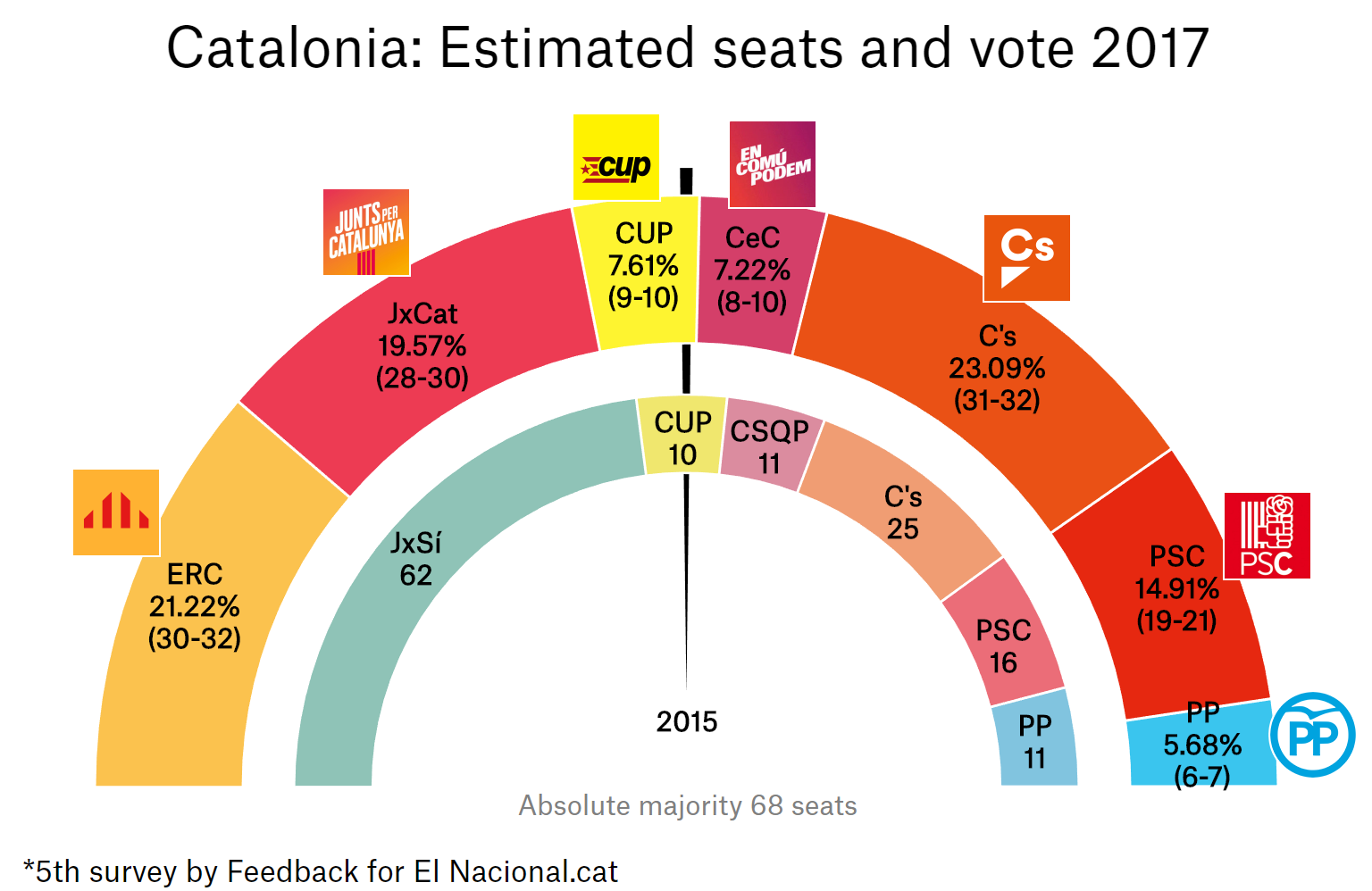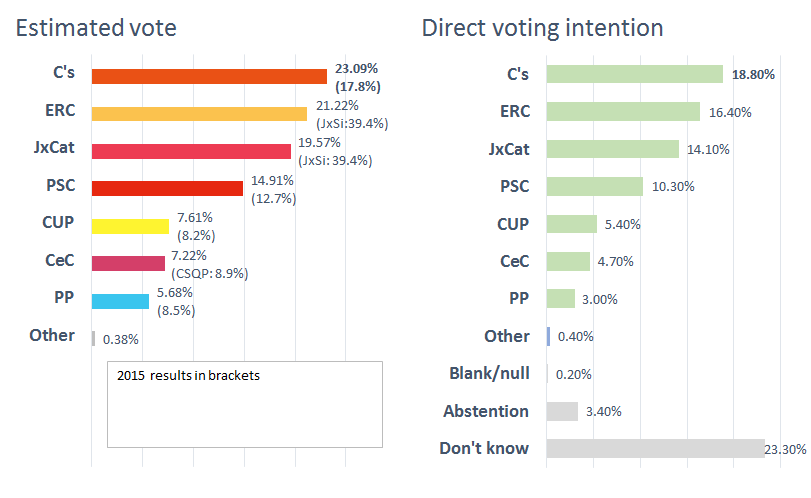

A three-way tie with six days to go to the 21st December Catalan election. Anti-independence Ciutadans (Cs) and pro-independence Esquerra Republicana (ERC) and Junts per Catalunya (JuntsXCat) are fighting for first place at the head of the race with each of the candidacies set to achieve around 30 seats in the new Catalan Parliament, according to the fifth tracking survey carried out by Feedback for El Nacional. The survey is based on a sample of 1000 interviews, carried out before 4pm this Thursday.
Cs remain the party with the most votes, as in our fourth survey, published 48 hours ago, but drops slightly in the estimated vote, from 23.57% to 23.09% and in deputies from 32-33 to 31-32. ERC, on the other hand, pushed out of first place last time, improves its percentage from 20.89% to 21.22% and its seats from 30-31 to 30-32. JuntsXCat climbs to its best result of the surveys so far, with 19.57% and 28-30 deputies meaning that, for the first time, it might equal ERC in seats.
PSC remains fourth, lowering its expectations from 20-21 to 19-21 seats (14.91%). CUP, third of the pro-independence lists drops in percentage terms from 7.70% to 7.61%, although its estimated 9-10 seats means it keeps its chance of repeating its result from the last election (10). They have clear water between them and the other left-wing alternative, Catalunya En Comú-Podem, who from 10-11 seats go down to 8-10 (7.22%). PP remains in last place, although slightly improves its result from the fourth survey, from 5-6 deputies to 6-7 (5.68%).
New momentum for JuntsXCat
The new momentum of the cross-spectrum pro-independence list led by president Carles Puigdemont from Brussels, which had already seen gains in our third survey, strengthens the pro-independence bloc, which also benefits from the slight improvement by the ERC candidacy led by Oriol Junqueras from Estremera prison, although they've lost support from the first survey.
CUP, headed by Carles Riera, loses percentage, but stays on an estimated 9-10 deputies, helping the pro-independence side's chances of ensuring an absolute majority in the new Parliament, with an estimated range of 67 to 72 seats (68 needed for a majority, they had 65-69 in the previous survey). In the last Catalan election, on 27th September 2015, Junts pel Sí (ERC and the party now behind JuntsXCat) and CUP won 72 seats. As for their percentage of the vote, 47.80% in the last election, it's now 48.40%.
Unionists, far from a majority
The unionists, on the other hand, remain far from the 68 deputies needed for an absolute majority. Cs lead the bloc (and will come first in votes according to the survey) but Miquel Iceta's PSC's expectations continue trending downwards and Xavier García Albiol's PP sinks. The increased presence of Spanish prime minister Mariano Rajoy in their campaign hasn't thus far served to save them from last place. The total of Cs, PSC and PP stalls with an estimated 56-60 seats (57-60 last survey) and 43.68% of the estimated vote, a little over two points more than in the 2015 election (41.62%, including the votes for Unió Democràtica, which didn't win a seat). In the most favourable scenario, the unionists will remain 7 deputies short of the pro-independence side's total.
Catalunya En Comú-Podem, which aspires to decide the future of the Catalan chamber gets its worst prediction for seats (8-10). Xavier Domènech's candidacy, backed by Barcelona mayor Ada Colau, sits far from the 11 deputies its predecessor Catalunya Sí Que Es Pot earned in 2015, led by Lluís Rabell.
High turnout
The expected turnout for the next Catalan election continues to break records, at 83.57% (74.95% in 2015). On the other hand, the number of undecided voters decreases, despite still being very high: 24.2% in the fourth survey provided by Feedback to 23.3% in this. In absolute numbers, that is 1,344,064 to 1,294,078.
Technical details:
- Area: Catalonia.
- Population: those aged 18 years and over with the right to vote in the elections to the Catalan Parliament on 21st December 2017.
- Method: telephone tracking survey.
- Sampling technique: random and proportional stratification based on quotas by province, sex, age groups and city type, according to electoral behaviour; and with overrepresentation in the 3 least-populated constituencies (the provinces of Tarragona, Girona and Lleida) to ensure a representative minimum sample in order to extrapolate electoral results, with subsequent application of weighting coefficients.
- Sample: 200 respondents daily, for a rolling total of 1,000 respondents. Each day the oldest 200 responses are removed and substituted by the most recent 200.
- Statistical conditions: confidence level of 95.5% (K=2), for this fifth survey the total margin of error is +3.16%.
- Fieldwork date: From Thursday 7th December at 4pm to Thursday 14th December at 4pm.

